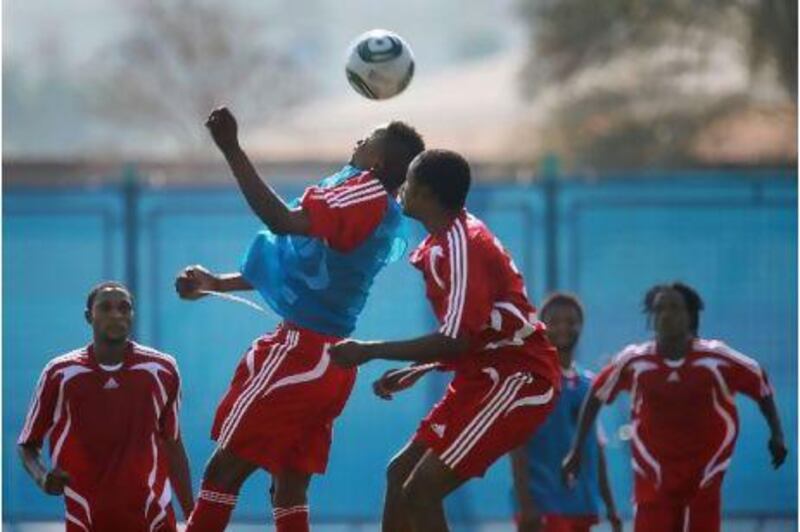Africa, Asia and North America are yet to make it to the party, writes Paul Oberjuerge
Inside the seven-side Club World Cup is an even more exclusive club with only two members, Europe and South America.
In the five stagings of the event since it took its current form, only teams from Europe and South America have contested the tournament's final. Clubs from Africa, Asia and North America, representing approximately 5.7 billion of the world's seven billion people, have never cleared the semi-final hurdle.
The semi-final win ratio is 10-0 in the favour of Europe and South America. The score in goals has been 26-8 in those 10 matches with clubs from Africa, Asia and North America. The underdogs have never led in the second half of a semi-final match.
Only once have they been level as late as the 72nd minute, when Al Ahly of Egypt were 1-1 with Internacional of Brazil in 2006.
Presumably, Europe and South American cannot go through to the Club World Cup final forever. But who will stop one of them, and how?
Could it be TP Mazembe of Africa when they play Internacional tonight? Or Seongnam Ilhwa Chunma of South Korea when they face Inter Milan tomorrow?
The challengers are under no delusions that they face a simple task to break new ground for their respective continents.
"We need to beat one of the best teams in the world," Mauricio Molina, the Seongnam midfielder, said.
"If we can produce that surprise then we reach the final and become the first side from Asia to do so. I hope to beat Inter Milan, but I know it will be so difficult. We must play a tactical game because [Inter] have the best players in the world and we cannot play open.
"They have a lot of players who can make a difference. Guys like [Samuel] Eto'o and [Diego] Milito can make something out of nothing and finish the game."
Lamine N'Diaye, the Mazembe coach, said: "Internacional are a strong team and we are looking forward to playing them. We will work hard and give our best to try to win it.
"African teams do not have the experience of the teams from South America and Europe, but this is our second time here and we are learning."
The easy explanations for European and South American dominance is the strength in depth of their confederation's club sides, and the money they spend to buy the best players, particularly in Europe.
Moise Katumbi, the Mazembe president, was justly proud when he said the club would commit US$10 million (Dh36.7m) to paying for players this year. It represents an enormous sum in Africa but it would scarcely buy one star player in the European market.
Thus, Mazembe's squad are predominantly Congolese, with a few Zambians and Cameroonians.
Seongnam is not as financially hamstrung as Mazembe, but the club have only three foreigners in their squad: Sasa Ognenovski, their Australian captain; the Colombian Molina in midfield and Dzenan Radonic of Montenegro in attack.
Inter, meanwhile, are a global all-star team. Internacional can choose from the seemingly inexhaustible supple of top talents inside their own country and still go over to Argentina to pick up gifted internationals such as Andres D'Alessandro, the midfielder, and Roberto Abbondanzieri, the goalkeeper.
Additionally, the European and South American champions have the huge benefit of playing dozens of difficult matches every year. "They have strong leagues. It's as simple as that," said Bernard Schumm, formerly the director of coaching at Bayern Munich who now holds a similar job for the Football Association.
"There is no substitute for 50 or even 70 games a year at a very high level. The physical aspect, the tactical experience, for these players from Europe and South American clubs, it is already there. For many African and Asian teams, this is a once-in-a-lifetime event."
Another hurdle confronting African and Asian clubs is that the best players from their country usually are playing in Europe, not for the league in their home countries. Playing away from home can make their national sides stronger in international competitions but weaker in club competitions such as this one.
Schumm said he cannot envision a side from Africa, Asia or North America winning the Club World Cup in the near future because it would require defeating two superior opponents. But winning one semi-final match? Perhaps.
"Maybe on a given day the Korean team can beat Inter Milan," Schumm said. "I don't believe it, but you never know. Maybe Inter Milan are having some troubles and they will take them on to the field with them and the Korean team can take advantage of this and get a little bit lucky.
"It would be good, because surprises make football interesting."
Certainly, Shin Tae-yong, the Seongnam coach, and N'Diaye of Mazembe will invoke the "on a given day" mantra with their sides tonight and tomorrow.
Said Shin: "I will tell them in the dressing room that it is worth a try to play our game against Inter because we might never have this opportunity again, so now that we do, we should do our very best."
[ poberjuerge@thenational.ae ]
*Additional reporting by Gary Meenaghan
Semi-final scores since format was adopted in 2005
Year Semi-final 1 Semi-final 2
2005 * Sao Paulo 3-2 Al Ittihad Liverpool 3-0 Saprissa
2006 Barcelona 4-0 Club America * Internacional 2-1 Al Ahly
2007 * AC Milan 1-0 Urawa Red Diamonds Boca Juniors 1-0 Etoile de Sahel
2008 LDU Quito 2-0 Pachuca * Manchester United 5-3 Gamba Osaka
2009 Estudiantes 2-1 Pohang Steelers * Barcelona 3-1 Atlante
* Eventual champions





